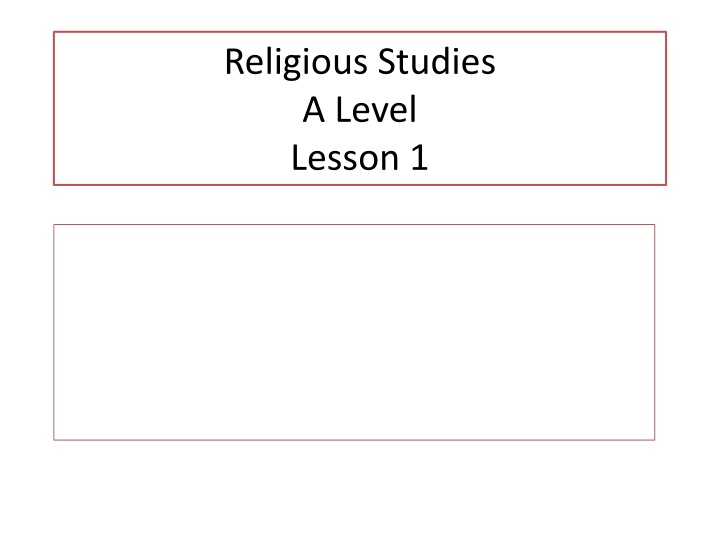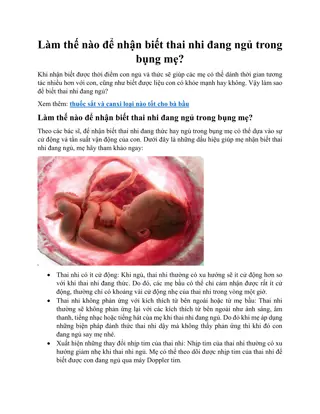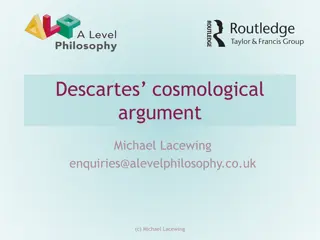
Exploring Religious Studies at A Level
Discover a comprehensive A Level Religious Studies curriculum covering topics like Christianity, Philosophy of Religion, and Religious Ethics. Engage in activities to enhance your understanding and prepare for assessments.
Download Presentation

Please find below an Image/Link to download the presentation.
The content on the website is provided AS IS for your information and personal use only. It may not be sold, licensed, or shared on other websites without obtaining consent from the author. If you encounter any issues during the download, it is possible that the publisher has removed the file from their server.
You are allowed to download the files provided on this website for personal or commercial use, subject to the condition that they are used lawfully. All files are the property of their respective owners.
The content on the website is provided AS IS for your information and personal use only. It may not be sold, licensed, or shared on other websites without obtaining consent from the author.
E N D
Presentation Transcript
Religious Studies A Level Lesson 1
A Level Religious Studies Christianity 1 Religious figures and sacred texts 2 Religious concepts and religious life 3 Significant social and historical developments in religious thought 4 Religious practices that shape religious identity Philosophy of Religion 1 Arguments for the existence of God 2 Challenges to religious belief 3 Religious experience 4 Religious language Religious Ethics 1 Ethical thought 2 Deontological ethics 3 Teleological ethics 4 Determinism and Free will
Activities You should have completed the Summer Preparation booklet Today s lessons will help to consolidate your knowledge in preparation for the initial assessment tomorrow.
Induction lesson review Initial assessment is Wednesday/Thursday Inductive and deductive argument What is an inductive argument? Arguments that cannot prove but can persuade by offering evidence from human experience in support of the conclusion What is a deductive argument? Arguments that can prove, if the premises are true then the conclusion must also be true. They are dependent on logic and not experience
Discussion activity Nicola, Clare, Simon and Henry went out together for a meal on Saturday evening they all chose the same main course and all four were sick during the night. Therefore, there was something wrong with the food. Why is this argument only probably true and not true beyond doubt? Use the key terms and concepts to help you
Two types of premise a priori and a posteriori 1. The circle is square 2. Carmel gained a grade B at A Level RS What is the difference in the way that you would find out if the premise is true? 1. You would know immediately, by definition 2. You would look at results and investigate the truth value (true or false), it would only be decided in the light of experience Independent learning complete the digital resource on Types of Premises on https://ncpreligiousstudies.wordpress.com/ Carmel RS B
The Cosmological Argument Lesson 1
The Cosmological Argument Specification Content 1 A. Inductive arguments cosmological: Inductive proofs; the concept of a posteriori . Cosmological argument: St Thomas Aquinas first Three Ways - (motion or change; cause and effect; contingency and necessity). The Kalam cosmological argument with reference to William Lane Craig (rejection of actual infinities and concept of personal creator).
Origins of the theory The theory has its origins in the thinking of Aristotle and Plato, however its most important supporter is Saint Thomas Aquinas.
Origins of the theory do not copy Early forms of the argument are found in the writings of Plato (428-348BC) and associated with Aristotle (390-323 BCE) . Both Plato and Aristotle argued the fact of motion i.e. things that move require a mover. Plato called this mover the demi-urge . However, if we keep looking for the cause of moving things then we will only arrive at something else moved by something else, and something which has moved this etc.
Do not copy Therefore, in order to find the first cause of all movement everywhere, we must look to something which has not been moved by something else. Thus Aristotle introduced the notion of an Unmoved Mover an eternal substance Prime Mover Both men were writing/thinking before Christianity existed. For Aristotle, movement means more than something travelling from A to B. Movement also includes . . . e.g. ?
Consolidation Tasks 1. Write brief notes that explain how the ancient Greek thinkers influenced the cosmological argument this is not on the specification but does help to give you an overview of key idea
St Thomas Aquinas Memory Board Look at the pictures/objects for 30 seconds Return to your group and describe as many things as you can remember. One member of the group to draw them! What do you think it tells you about St Thomas Aquinas? Read the information and compare it to your ideas
Thomas Aquinas (1225-1274) Listen to and read the next four slides as there is a memory test at the end! St. Thomas Aquinas is considered by many to be the greatest theologian of the middle ages. He was born in Aquino, Italy. At the age of five he was sent to an abbey until the age of fourteen when he went to the University of Naples. After becoming impressed by his Dominican teacher he decided to enter that order and go to study in Paris.
Nicknamed the 'Dumb Ox, he nevertheless impressed his fellow academics with his brilliance in public discussions (his professor, Albert the Great, is reported as saying, 'This dumb ox will fill the earth with his bellowing'). He believed the writings of the ancient Greek philosophers (Plato and Aristotle) could be adapted and used to support the existence of the Christian God.
Aquinas became a writer and wrote commentaries on most of the books of the Bible. His most famous works are 'Summa Theologica' and 'Summa Contra Gentiles'. He used Philosophy in a lot in his theological writings including his famous 'Five Ways which are an attempt to prove (or justify) God's existence on the basis of what can be known from the world. His justification for his 'proofs' is that the existence of God is not evident to people but must be proved and the basis of these 'proofs' could be found in the created order - the 'fingerprints of God' (Romans 1:20).
The Big Picture of Aquinas philosophy Theistic proof an attempt to prove by argument that God exists. The idea that we can reason out the arguments for God and be convinced about them is known as natural theology. This assumes that we can use our cognitive faculties to reach conclusions about whether God exists or not.
Memory test Imposters? 18th century Dominican monk Aquino Plato Dumb bull Summa Theologica Theistic probability Natural theology Five ways fingerprints of God Spain Aristotle
Exam Focus Task Write a paragraph including three points about Aquinas philosophy focus on his purpose in writing and his ideas. Aquinas was writing in the _____ century, he was influenced by _______ and _____________. He wrote ___________ Literacy focus Theistic Proofs Natural theology Peer assessment High Grade Focus you will include accurate explanations of key vocabulary e.g. Theistic proofs and natural theology You should not include his biography in essays but it does help your own understanding of the timeline of philosophy . Remember - he was writing/thinking during the middle ages (1225-1274)- pre modern science
Knowledge Check Complete the knowledge check activity 1. Is the Cosmological Argument inductive or deductive? 2. What does a posteriori mean? 3. Underline the correct definition to the key term. The ability to become something else. 4. Potentiality or actuality 5. Did Aquinas use the example of fire and water or marble and sculptor? 6. Write a definition of infinite regress. 7. Is the second way referred to as Motion and Change or First Cause ? 8. What example can we use for the second way? 9. What does contingent mean? 10. What does necessary mean? 11. What is an efficient cause?
Aquinas three ways First way Everything that moves is moved by something else. The moved is moved by something else. But the chain can t be infinite (go on forever) Therefore there must be an unmoved mover. Fire and wood Sculptor Second way Everything has a cause Every cause has a cause However there cannot be an infinite number of causes Therefore there must be an uncaused cause God Domino not Aquinas Third way Individual things come into existence and later cease to exist Therefore at one time none of them was in existence But something comes into existence only as a result of something else that already exists Therefore there must be a being whose existence is necessary God Copleston s parent and child analogy
Quick recap Try to complete this without using your notes or the booklet! Then self assess using your CA booklet 1st way 2nd way The Cosmological Argument Aquinas's THREE ways 3rd way
Talk Partners Talk to your partner about . . . 3 new things you have learnt focus on key vocab What you found easy? What you found challenging? Something they would like to learn in the future?






















